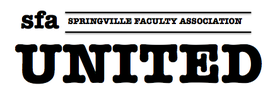What is Collective bargaining (AFL-CIO)
Collective bargaining is a process in which working people, through their unions, negotiate contracts with employers to determine their terms of employment, including pay, health care, pensions and other benefits, hours, leave, job health and safety policies, ways to balance work and family and more. Employees jointly decide their priorities for bargaining.
Union employees choose who will speak for them in bargaining sessions with the employer, and vote to accept or reject the contract reached by the employer and employee bargaining committees. A ratified contract legally binds both sides—management and workers—to the contract terms. In the United States, some three-quarters of private-sector workers and two-thirds of public employees have the right to collective bargaining. This right came to U.S. workers through a series of laws. The Railway Labor Act granted collective bargaining to railroad workers in 1926 and now covers many transportation workers, such as those in airlines. In 1935, the National Labor Relations Act (NLRA) clarified the bargaining rights of most other private-sector workers and established collective bargaining as the “policy of the United States.” The right to collective bargaining also is recognized by international human rights conventions. The freedom to form and join a union is core to the United Nations Universal Declaration on Human Rights and is an “enabling” right—a fundamental right that ensures the ability to protect other rights. Every year, some 30,000 collective bargaining agreements are negotiated. Today, about 8 million private-sector workers and some 8 and a half million public-sector workers are covered by collective bargaining agreements. |


